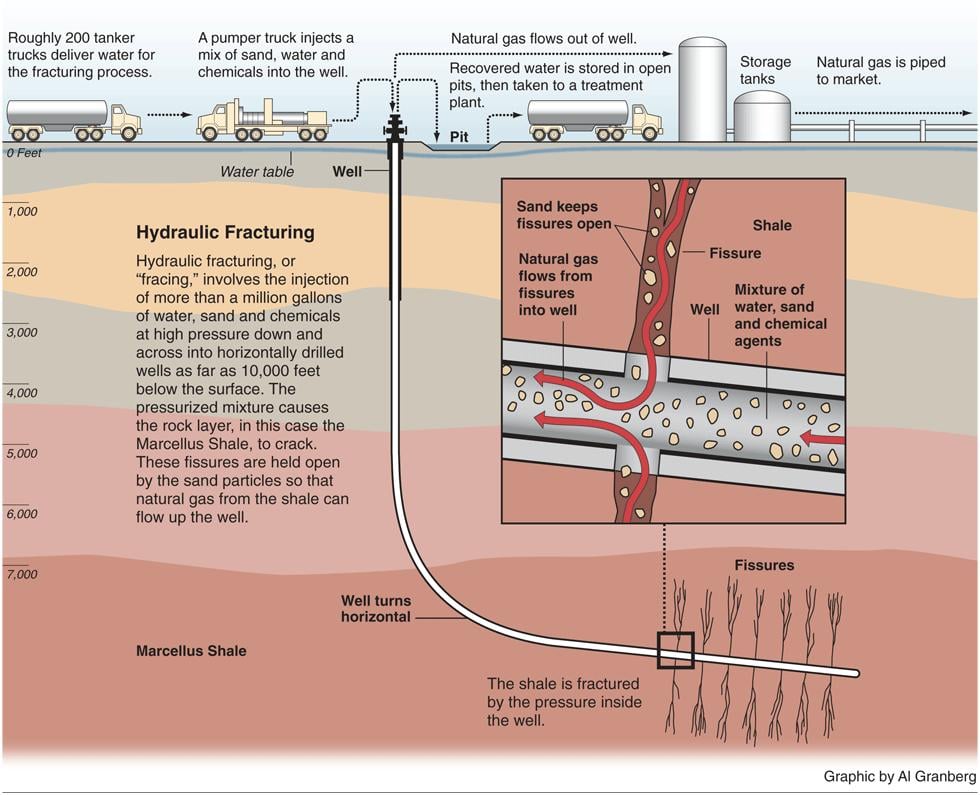 (Thanks to ProPublica for this graphic.)
(Thanks to ProPublica for this graphic.)Thankfully, we are, slowly but certainly, entering a new ballgame on hydraulic fracturing. Yes, we need the gas trapped in shale – in the medium term. Long term: renewables. But, for now, as we transition to renewables, we’ve got to reduce the carbon footprint of the electric power, transportation and industrial sectors. The caveat, as with all matters of energy and the environment, is we absolutely must do this in a way that protects the public health and does not exacerbate climate change. These are issues that I have addressed a number of times here. (See these posts from me and from the FPA bloggers on energy.)
What I have said is that (a) it is absolutely do-able to both protect the environment and the public health, and (b) to reap the many benefits of this resource if there is a political will. The engineering exists to make this a virtually negligible problem. What needs to happen, though, is for the regulatory agencies, fully backed by the elected officials with proper funding and sans the incessant sniping at environmental protection laws and regs, to make the industry perform. What help would be if the industry would quit their incessant moaning, tell their lobbyists and operatives in Congress to back off and then get on with the business at hand. Did nobody ever explain to these people that environmentalists can help their cause? Environmentally responsible, high-level clean tech engineering for these rigs, and an open and visible regulatory process is the only way to do business.
The NY Times quotes here from an important report, out last week, from a prestigious federal panel: “The public deserves assurance that the full economic, environmental and energy security benefits of shale gas development will be realized without sacrificing public health, environmental protection and safety.” That says what needs to be said.
The Natural Gas Subcommittee of Steven Chu’s Energy Advisory Board has a couple of full-tilt environmentalists, Fred Krupp, president of the Environmental Defense Fund, and Kathleen McGinty, a former top Pennsylvania and federal official, among its other members. Krupp had this to say in a release: “Rigorous, well-designed standards and improved transparency and disclosure can help ensure that shale gas is developed responsibly now and in the future.”
In addition to the new report from Chu’s blue ribbon panel, the EPA last month proposed new, much tighter rules for air emissions from oil and gas rigs. The EPA press release also emphasizes that the new rules will “…leverage operators’ ability to capture and sell natural gas that currently escapes into the air, resulting in more efficient operations while reducing harmful emissions that can impact air quality in surrounding areas and nearby states.” So, oil and gas boys, instead of your eternal knee-jerk reaction to fight regulation, why not consider this a way to advance your bottom line? Fewer fugitive emissions = more product to sell.
Thanks to the excellent blogger, Kirsten Korosec, for flagging, a few months back, this useful and youthful video that hits some of the key points on hydraulic fracturing. The main point to remember, though, is, as the video reminds us: Getting shale gas out can be done right and must be done right.